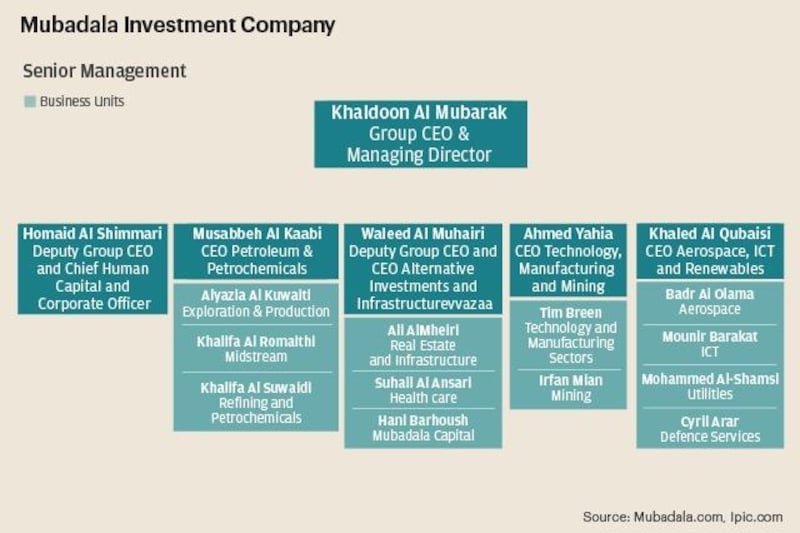Mubadala Investment Company has set out its new corporate divisions and its leaders as part of the US$122 billion merger of Mubadala Development and the International Petroleum Investment Company (Ipic), which was announced last summer.
Abu Dhabi’s new strategic investment company sets up four investment platforms “of significant scale”, the company said, with “Petroleum & Petrochemicals” accounting for 31.1 per cent of the group and incorporating the main assets of Ipic, as well as Mubadala Petroleum’s mainly Asia-focused upstream portfolio, and it will be led by Musabbeh Al Kaabi, who was previously the head of Mubadala Petroleum.
An “Alternative Investments and Infrastructure” platform, accounting for 31 per cent of asset size, will be led by Waleed Al Muhairi, which means there is essentially no change at the top of what Mubadala previously called “emerging sectors”, which incorporates its disparate holdings in investment companies, including the private equity firm Carlyle and the Bahrain-based money manager Investcorp, as well as its healthcare portfolio, such as Cleveland Clinic Abu Dhabi, and various infrastructure projects, particularly Al Maryah Island in Abu Dhabi.
The third largest division will be “Technology, Manufacturing and Mining”, accounting for 21.6 per cent of assets, with subdivisions including legacy Mubadala assets GlobalFoundries, a semiconductor chipmaker, and Emirates Global Aluminium – which also owns a bauxite mine in Africa – plus a copper, zinc and lead mine in Spain (Matsa) and a gold mine in Colombia (Minesa). Ahmed Yahia continues as chief executive of this grouping.
Finally, “Aerospace, ICT and Renewables” will cover 10.6 per cent of the assets and house the aerospace companies, led by the airplane parts maker Strata, as well as communications assets like Yahsat, a satellite operator. It also will be the new home of the Masdar renewable energy company.
The remaining 5.7 per cent of the group consists of other corporate assets including cash.
Khaled Al Qubaisi, who previously was the head of human capital at the Mubadala legacy company, will run the aerospace, ICT and renewables division, swapping roles with Homaid Al Shimmari, who will be the head of human capital in the new company. Like Mr Al Muhairi, Mr Al Shimmari will also have the added role of deputy chief executive under Khaldoon Al Mubarak, the group chief executive and managing director.
Ahmed Al Calily, who previously had been in charge of the legacy Mubadala energy platform – which in the old organisation included Masdar, as well as Mubadala Petroleum – will be the new group’s chief strategy and risk officer.
The company said that the new company organisation formally takes effect in May this year.
Other executive board staff positions are filled by Carlos Obeid, the chief financial officer; Samer Halawa, the chief legal officer; and Brian Lott, the chief communications officer.
The company announced the full board last month, with Sheikh Mohammed bin Zayed, Crown Prince of Abu Dhabi and Deputy Supreme Commander of the Armed Forces, as the chairman and Sheikh Mansour bin Zayed as the vice chairman. Mr Al Mubarak sits on the main board, with five others from the legacy companies including Suhail Al Mazrouei, the UAE Energy Minister and formerly the managing director of Ipic.
A key decision for the new group was to have its largest division – especially by revenue and profit – focused on petroleum industries. At the business unit level, this company will be headed by former Ipic executives, including Alyazia Al Kuwaiti, who is the only woman in the senior ranks of the new organisation, heading the upstream part of the portfolio.
The petroleum and petrochemicals division includes the controlling share of Austria-based Borealis, the wholly owned Cepsa of Spain and Nova Chemicals in Canada, which together have given the group a strong downstream base in a number of market segments.
Notably, the new company decided to separate off and create a new utilities business unit, which will be run by Mohammed Al Shamsi, a five-year veteran of Mubadala, where he had also been running a utilities portfolio. Mohamed Al Ramahi continues as chief executive of Masdar. Both Mr Al Shamsi and Mr Al Ramahi will report to Mr Al Qubaisi overseeing the platform that also includes aerospace and ICT.
In that grouping, the legacy aerospace and defence subdivision has been split into two business units in the new structure, with Cyril Arar, who had been executive director of the combined businesses at Mubadala, now overseeing the defence interests, while Badr Al Olama, previous chief executive of Strata, will now head up aerospace.
Under the technology, manufacturing and mining platform, Tim Breen, who previously oversaw a wider group at Mubadala, will now be in charge of technology and manufacturing sectors – basically, GlobalFoundries and Emirates Global Aluminium – while a new mining unit will be run by Irfan Mian. Mr Breen and Mr Mian are, like the head of the platform, Mr Yahia, former McKinsey & Co consultants.
The business unit heads under the alternative investment platform – health care; capital; and real estate and infrastructure – remain unchanged from the legacy Mubadala company.
Mubadala Investment Company’s total assets stood at $122bn at the end of June last year, according to calculations based on unaudited accounts.
amcauley@thenational.ae
Follow The National's Business section on Twitter





